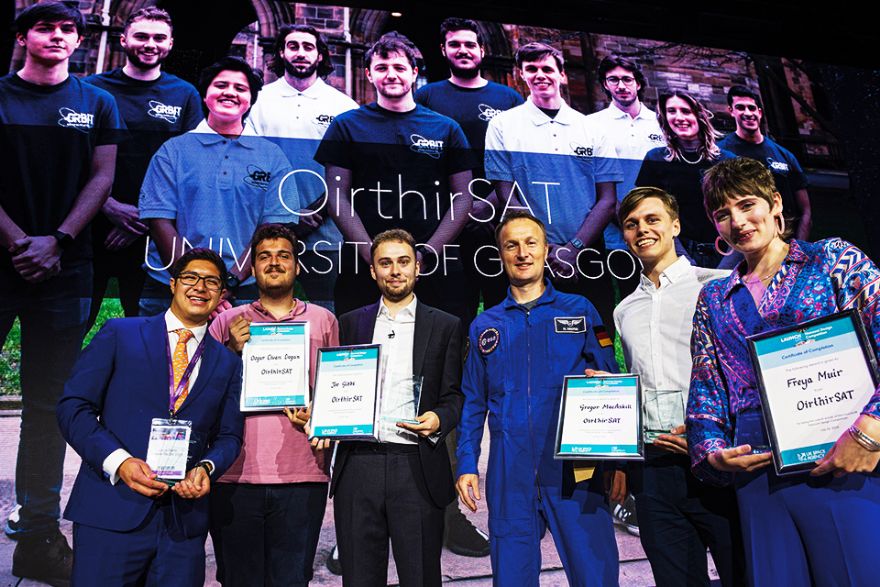 Members of the OirthirSAT team, from the University of Glasgow, with European Space Agency astronaut Matthias Maurer at the Farnborough International Airshow. Credit: UK Space Agency
Members of the OirthirSAT team, from the University of Glasgow, with European Space Agency astronaut Matthias Maurer at the Farnborough International Airshow. Credit: UK Space AgencyTen students designed a satellite to analyse shorelines and coastal vegetation to help scientists and policymakers understand the impact of climate change on coastal regions, as part of the
Nanosat Design Competition, run by the
UK Space Agency and
Department for Transport.
The winning team from Glasgow, named OirthirSAT, beat more than 40 teams from across the UK, aged between 16 and 37, with the judges praising their entry for identifying a clear way to tackle climate change and test new technologies.
Transport Secretary Grant Shapps said: “With satellite launches due to start from home soil this year, there is no better time to support the next generation of space experts in developing satellites to support our mission against climate change. My congratulations go to OirthirSAT and everyone shortlisted for their hard work throughout this competition, and I applaud the innovation all the teams have shown throughout.”
The UK is set to become the first country in Europe to host small satellite launches in 2022, building on the UK’s leading small satellite industry and creating highly-skilled jobs across the country. This will also help UK scientists use space technology to help tackle global challenges, including climate change.
Innovative ideasDr Paul Bate, CEO of the UK Space Agency, said: “Satellite technology plays a crucial role in monitoring our climate and it is fantastic to see so many innovative ideas to help tackle the most pressing issue facing our planet. My congratulations go to the winners from the
University of Glasgow for their excellent design.
“The countdown to the first satellite launch from UK soil is on and this will be a historic year for our space sector. Being the first country in Europe to offer launch will boost our satellite industry further, creating hundreds of new jobs across the UK.”
The Nanosat Design Competition opened in November 2021, with aspiring space scientists invited to design a small satellite suitable for launch from the UK to help inform solutions to climate change. Five teams were chosen from the initial entries to go through to the final stage, which included a four-month mentoring programme with space sector experts.
The OirthirSAT team was announced as overall winners at a ceremony with Dr Paul Bate and ESA astronaut Matthias Maurer at this year's
Farnborough International Airshow.
Freya Muir, PhD student at the University of Glasgow on the OirthirSAT team, said: ”We’re so proud to have won the competition and have all our hard work recognised by the sector. It’s not just a win for us and the university, but for coastal stakeholders and decision-makers who will get valuable use from our data. This is an incredible opportunity, and it’s hugely exciting to be able to develop our winning design to help protect our coastal communities against climate change.“
Steep learning curveJoe Gibbs, PhD student and OirthirSAT’s programme engineering manager, said: “The last eight months have been a steep learning curve and we’re delighted that the hard work has culminated in the winning proposal. This project has really showcased the current potential in the UK space sector, and we hope to demonstrate further cooperation amongst companies in our proposal to study the effects of climate change on UK coastlines.
“I am excited to not only refine the OirthirSAT proposal in the next phase of the design process, but to also develop an expansive outreach programme to showcase the UK space sector to future engineers and scientists.”
The four other finalists came from
Reliance Precision Engineering, in Huddersfield,
Sir William Borlase’s Grammar School, in Marlow, Buckinghamshire, the
University of Kent and the
University of Southampton. Glasgow’s OirthirSAT team will use the prize money to build their satellite with ongoing support from the competition’s mentors, to help develop their proposal from design to build, with a view to launching from the UK in the coming years.
Iain Stewart, UK Government Minister for Scotland, said: “Congratulations to the University of Glasgow students behind this innovative satellite design. I look forward to seeing how this UK Government funding helps bring their fantastic ideas to life. With satellites playing an ever-greater role in monitoring and helping combat climate change, it is inspiring to see Scotland’s next generation of scientists exploring new ways that space technology can help us understand our environment.”
Scotland’s space sector is booming, and now accounts for around one fifth (18%) of the UK space workforce, according to the latest figures. Scotland will also host the UK’s first vertical small satellite launches next year, from the
SaxaVord and
Sutherland spaceports.
Levelling up the space sector is a key priority for the UK Space Agency and there are now 1,293 space organisations located across the UK. Spaceports are set to increase jobs further in the coming years, alongside the growth of regional space clusters, international investment, and emerging technologies such as in-space manufacturing and debris removal.